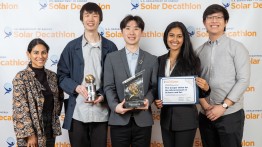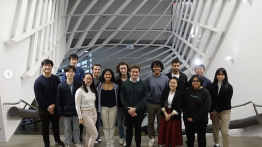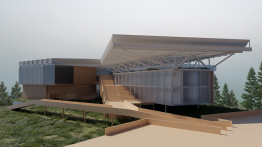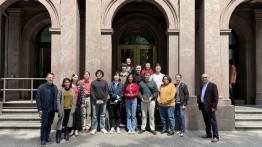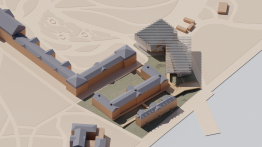Cooper Team Wins a Solar Decathlon Grand Prize
POSTED ON: April 26, 2023
After traveling to the National Renewable Energy Laboratory in Golden, Colorado to present its design for the extension and renovation of the Urban Assembly New York Harbor School on Governors Island, The Cooper Union's Solar Decathlon team was awarded the 2023 US Department of Energy Solar Decathlon Design Challenge Competition Commercial Grand Prize. See the official DOE announcement and watch their presentation video.
Members of the team described their project, built on zero-energy retrofit principles, to the National Renewable Energy Laboratory (NREL). Their design is focused on the New York Harbor School, a public college-prep high school located on Governor’s Island. The team’s plan also promotes workforce development opportunities for the community.
The annual Solar Decathlon Design Challenge allows students to collaborate in multidisciplinary teams to develop innovative and high-performance building designs that tackle real-world issues related to climate change, affordability, and environmental justice. Teams work on either a residential or commercial design project for one or two academic semesters, culminating in the Solar Decathlon Competition Event held at NREL.
Winning the grand prize is no small feat, as teams had to first qualify at the semi-finalist competition in February 2023 in one of six subdivisions: New Housing, Retrofit Housing, Attached Housing, Multifamily Building, Office Building, or Education Building. The Cooper team ranked as one of 10 finalists under the Education Building Division to advance to the national event; the team had to first win the subdivision before being awarded the Commercial Grand Prize.
Solar Decathlon is part of Cooper’s Vertically Integrated Projects (VIP) Program. Students were able to participate in the competition thanks to alumnus Alan Fortier ChE’79 & the President's Office Innovation Grant Program and a generous grant from the IDC Foundation’s Innovative Initiative.
Cooper's multidisciplinary team includes the following students: from The Irwin S. Chanin School of Architecture, Ji Yong Chung, Tate Liang, Shannagh H. Crowe; from civil engineering, Lionel Gilliar-Schoenenberger, Sophia Zhao, Matviy Zhachek, Vito Di Gregorio, Mohamad H. Hassan, Benny Wu, Shirley Xingyu Yan, Larry Zeng; from mechanical and electrical engineering, Sarah Coraizaca, Samantha Wu Mizanul Hoque, Amelia Roopnarine, Grace Ee, Yu Shan Luo. The team's faculty advisors are Melody Baglione, Pamela Cabrera, Julian Palacio, Nader Tehrani, Cosmas Tzavelis, and David Wootton.

